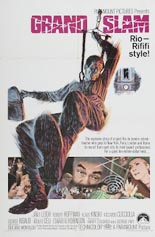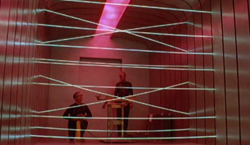
 No sooner has this delightfully creepy children’s video began than a giant bear with a pleasant voice starts shaking his massive behind while singing a self-penned ditty about the benefits of “going potty.” One of the lyrics is “You’ll feel like a millionaire / When you pull up your underwear.” What correlation exists between financial independence and the ability to hike one’s briefs successfully to waist level is lost on me, but that’s really beside the point.
No sooner has this delightfully creepy children’s video began than a giant bear with a pleasant voice starts shaking his massive behind while singing a self-penned ditty about the benefits of “going potty.” One of the lyrics is “You’ll feel like a millionaire / When you pull up your underwear.” What correlation exists between financial independence and the ability to hike one’s briefs successfully to waist level is lost on me, but that’s really beside the point.
With Bear in the Big Blue House: Potty Time with Bear, what I should be most concerned about is that there is an obese bear who, although a total stranger, really wants to teach our children about proper anal usage, and his eagerness to do so just strikes me as — how to put this? — wrong and illegal in most of the 48 contiguous states.
 As he plays checkers with a mouse who I think was named Tutter, Bear asks his little friend if he needs to use the bathroom. Tutter says no. Bear asks again. Tutter again declines. Undaunted (or perhaps blessed with the power of mind control), Bear asks yet again, practically willing a full intestinal tract on his rodent pal, so Tutter rushes off to the toilet to take a dump. We join Tutter on the pot as he tells Bear he won’t be much longer: “I just have to wipe!”
As he plays checkers with a mouse who I think was named Tutter, Bear asks his little friend if he needs to use the bathroom. Tutter says no. Bear asks again. Tutter again declines. Undaunted (or perhaps blessed with the power of mind control), Bear asks yet again, practically willing a full intestinal tract on his rodent pal, so Tutter rushes off to the toilet to take a dump. We join Tutter on the pot as he tells Bear he won’t be much longer: “I just have to wipe!”
I never thought I’d see the day when a Jim Henson program would feature a puppet in mid-defecation, and not only that, but one that would use the word “wipe” as a verb, in a context that involved wadded-up two-ply and the risk of fecal contamination. But that day indeed came, and it was Dec. 8 — a date that will live in infamy.
Bear excuses himself upstairs, where another of his noticeably younger chums is engaged in voiding bodily waste. Bear joins this tot in the bathroom and they carry on a conversation while the little one has his pants ’round his ankles. And I really couldn’t watch any further. —Rod Lott


 Bruno Nicolai’s theme to
Bruno Nicolai’s theme to 




 Freshly retired from a school in Rio de Janeiro, history professor James Anders (Edward G. Robinson, see?) will not go gently into gardening and bingo games. Instead, he returns to New York with a proposition for a childhood chum who’s grown into an über-wealthy corporate criminal (Adolfo Celi,
Freshly retired from a school in Rio de Janeiro, history professor James Anders (Edward G. Robinson, see?) will not go gently into gardening and bingo games. Instead, he returns to New York with a proposition for a childhood chum who’s grown into an über-wealthy corporate criminal (Adolfo Celi, 

 To paraphrase one of Keanu Reeves’ more famous lines from
To paraphrase one of Keanu Reeves’ more famous lines from 